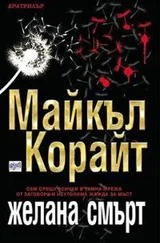“Oh, honey,” Mom says. “Oh, baby.” She’s squeezing Tara’s hand and blinking away tears. Dr. Pine tolerates the interruption. Behind them, Dr. Carlisle paces and smiles.
Competitive, Tara thinks. She found me in here first. He wants me now. That is just fine with her. The more the merrier when it comes to people invested in her return, but she wonders if they’ll remember who suggested she watch Jaws.
Mom releases her hand, rises, gets her iPad, then rushes back, holding it with the camera lens trained on Tara. She’s shaking so badly it seems unlikely she’ll be able to keep it in her hands, let alone in focus. Tara wants to laugh. For years, she and Shannon made fun of Mom’s insistence on capturing every family moment on film, but even now ?
Dr. Pine says, “Tara, let’s try for yes and no. When you want to indicate a yes response, look up once. When you want to say no, do it twice.” He pauses and wets his lips, and for the first time Tara sees that behind the clinical demeanor, he’s nervous. “Okay,” he says. “Tara, do you understand what I just said?”
She looks up. Once.
“Tara, does two plus two equal ten?”
She looks up twice.
Dr. Pine lets out a long breath. “We’re batting a thousand,” he says. “Tara, is Shannon your sister?”
Up once.
“Am I your father?”
Up twice.
Mom is crying now, tears streaming down her face, over those purple rings below her eyes that have darkened with each day in here; her iPad shakes in her hands like a highway sign in hurricane winds.
Shannon pushes in beside Dr. Pine, kneels, and looks at Tara with a trembling smile. “Tara,” she says, “did you ever quit?”
Dr. Pine looks annoyed at the intrusion, but when Tara moves her eyes upward twice and they all burst into a clumsy hybrid of tears and laughter, he smiles charitably and lets them have their moment. He keeps watching Tara, though, his focus unbroken.
“Tara,” he says, “would you like to try the alphabet board?”
Up once.
He stands. “Okay,” he says, “let’s see what she can do.”
Yes, Tara thinks. Let’s see. It’s the first time she’s been given an active role — even the crucial fMRI was passive; she was shoved into a tube and shown a movie — and the opportunity is both exhilarating and exhausting. The joy that comes with being known, with being breathed back into existence in the room, is an injection of adrenaline, but the eye tests were oddly fatiguing, as if simple willpower drains her. Perhaps it does. But she’s got willpower reserves they haven’t seen yet, and she’ll figure out how to replenish them, locked-in or not.
“This is all just a starting point,” Dr. Carlisle says. “Yes/no communication is, obviously, an enormous step. But we’ve got an open road ahead of us now.”
Dr. Carlisle begins to talk about a combination of rudimentary alphabet boards and sophisticated computer software, and Dr. Pine chimes in with a discussion of tongue-strengthening exercises — those sound like fun. Mom returns to her chair and focuses on her iPad. Tara watches in astonishment as she taps away, seemingly oblivious to the conversation around her. Are you bored, Mom? I’m back from the dead, but you’ve got e-mail to check? Then Mom rises with a smile and brings the iPad to Tara and turns it to face her.
“You have no idea how badly I’ve wanted to be able to post this,” she says, starting to cry again.
On the screen is the Team Tara Facebook page. Mom has pinned the video of Tara’s eye-motion test with a caption: We have blessed news! Tara is awake!
Back when he’d been rehearsing for the fugitive role, asking Abby countless questions about how she’d handle herself on the run, Luke had given her a simple but memorable piece of advice: “Never underestimate the helpfulness of your local library.”
On her first day as a fugitive, Abby headed for the library in Rockland. In Luke’s script, there’d been dialogue about big cities being better to hide in than small towns, because nobody paused to look at a stranger in a place where everyone was a stranger. She believed that, but big cities were hard to come by in Maine, and so she settled for Rockland, the county seat, home to the courthouse and the jail and the BMV. A regular metropolis by Maine standards, with maybe twenty thousand residents.
She parked several blocks from the library, near the harbor in a busy parking lot that was shared by two seafood restaurants and a YMCA, and she walked along the water for twenty minutes, watching her back, before she moved toward town. No one followed. In the library, she found a computer where she could sit with her back to the wall and her eyes on the door.
When she logged on to the internet, her first instinct was to read about herself. Pragmatic fugitive behavior or clinical narcissism? She wasn’t sure, but a cursory review of news sites was reassuring to her invisibility, if not her ego — the reports were that Hank Bauer had died in a car accident whose cause was currently under investigation. Police in Maine were keeping Abby’s story quiet for a reason, or possibly they didn’t believe it, but in any case, they weren’t making a big deal out of her call to David Meredith.
Not yet.
She moved on to Amandi Oltamu. There was plenty to read here, because Amandi Oltamu had been an important man, but Abby was going to need a translator to help her understand half of it.
The obituaries were helpful but vague, capturing his childhood escape from a war-torn Sudan and his education history (Carnegie Mellon and MIT) and revealing that his marriage had ended in divorce and he had no children. He was described as “renowned in his field.” Okay, Abby thought, let’s find out some more about that field. A few searches later she landed on a paper written by Oltamu. The title was “Improving the Coupling of Redox Cycles in Sulfur and 2,6-Polyanthraquinone and Impacts on Galvanostatic Cycling.”
It wasn’t a good sign that Abby was tentative on the pronunciation of two of the words in the title.
She didn’t waste time attempting to wade through the entire paper. If there was a clue in that paper, Abby wasn’t going to be able to identify it. Instead, she went to the Hammel College site and found a short press release on Dr. Oltamu’s scheduled talk. This one was at least a bit more civilian-friendly: He was going to speak on how batteries could combat climate change. The press release didn’t mention anything about teenage assassins, though. Less helpful.
Oltamu’s bio on the site said that he’d consulted with the International Society for Energy Storage Research. The ISESR page noted that his work was focused on a new paradigm for battery energy storage at atomic and molecular levels.
Terrific. And tragic. He’d been doing vital work, and then he was killed. Maybe the vital work was why he’d been killed. If so, that was going to require more understanding of the topic than Abby could glean from web searches. There was a better chance of her figuring out how to jailbreak the security on that cloned iPhone than of her determining the breakthrough Amandi Oltamu had made with regard to the new paradigm of galvanostatic coupling. Or cycling. Whatever. Understanding the importance of Oltamu’s work required an advanced degree, or at least the ability to pronounce polyanthraquinone without sounding like Forrest Gump.
Jailbreaking the device Oltamu had left behind seemed like the better option, but Abby had failed once already. She’d tried Tara and not Tara Beckley, but if Tara Beckley was wrong, she was down to one swing of the bat. She still didn’t understand the security approach either; shouldn’t it be more advanced, a fingerprint or a retina scan or facial recognition?
Читать дальше






![Майкл Корита - Те, кто желает мне смерти [litres]](/books/396555/majkl-korita-te-kto-zhelaet-mne-smerti-litres-thumb.webp)





